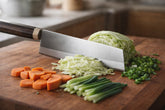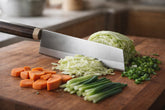Are Raindrop Damascus Steel Knives Good for Kitchen Use?
You can truly elevate your cooking experience when you choose the right kitchen knife. A high-quality knife can change your cooking entirely. Imagine having a blade that is impressively sharp, durable, and strikingly designed. The Raindrop Damascus knives are a perfect marriage of beauty and functionality.
Knives such as these are not only highly functional but also feature unique patterns that are mesmerizing. A powerful kitchen tool and an art piece at the same time, these blades are forged from layers of steel. Are Raindrop Damascus steel truly the best option for kitchens?
Whether you're a home cook or a professional chef, Damascus steel knives are a favorite. They have razor-sharp edges and long-lasting durability, making them the perfect kitchen upgrade. Find out why they make great kitchen additions.
What is the Damascus Raindrop Pattern?

Raindrop Damascus is one of the most visually captivating Damascus patterns. Different types of steel are layered and forged to achieve this pattern, resulting in a stunning visual effect. Ripples or raindrops resembling ripples across the blade, hence its name.
The process begins by layering soft and hard steels. A strong bond is formed by heating, folding, and hammering the layers repeatedly. An impression is made on the blade's surface by pressing or drilling circular impressions before the final etching. Acid-etching then reveals the beautiful raindrop effect on the blade, highlighting the contrast between the different steel layers.
As well as enhancing aesthetics, Raindrop Damascus steel pattern bolsters structural integrity. The layering process creates a blade that is strong yet flexible, providing both durability and excellent edge retention. Blades made of Raindrop Damascus combine artistic design with outstanding performance. Handcrafted patterns turn every knife into a unique piece of art. You can use Raindrop Damascus knives for both professional and home cooking.
How Does a Raindrop Damascus Blade Work for Knives?

Besides being stunning, Raindrop Damascus steel is a powerhouse of performance. Typically, soft and hard layers are alternated to make the steel. A raindrop pattern is created by repeatedly folding these layers. Combining hardness and flexibility, the blade maintains sharpness for a long time.
This layering is crucial for knives. Knives with hard layers stay sharp for longer; knives with softer layers are tougher, making them less brittle and more resistant to chipping. When you use knives in the kitchen to cut through tougher meats or chop vegetables, this combination is particularly important. As well as having excellent edge retention, it also requires less frequent sharpening. Its layered structure leverages both strength and flexibility, providing a durable and resilient blade. In addition to being sharp and durable, they are also highly wear-resistant, making them ideal for both professional and home cooks.
How can Damascus Raindrop Benefit your Kitchen?

One of the reasons Raindrop Damascus knives are gaining popularity is because of these key benefits:
Sharpness that Lasts
With these knives, you won't have to sharpen them as often, so you'll have more time to enjoy effortless cutting.
Rust and Corrosion Resistance
The high-quality stainless steel layers incorporated into Raindrop Damascus can withstand moisture, which makes them a practical choice for the kitchen environment.
Stunning Aesthetics
Each knife features the signature raindrop pattern, ensuring that your kitchen setup looks as good as what you cook. They are true conversation starters.
Clean Cuts, Better Flavors
Cutting with sharp blades preserves the flavor and texture of your ingredients, minimizing bruising and crushing. This is especially important when preparing food for presentation or delicate ingredients.
The Making of Raindrop Damascus Steel

This steel is made using a specialized process that incorporates both art and craftsmanship. A high-carbon steel layer is stacked on top of a softer steel layer. Intense heat is used to fuse these layers together, strengthening the overall steel structure. Twisting and hammering the steel repeatedly increases its density and durability once the layers fuse. In creating the raindrop-like patterns, this twisting process is key.
The steel is acid-etched after it is worked to the desired thickness and shape. The acid interacts with the different metals to highlight the beautiful raindrop design by selectively darkening certain layers. As a result, the knife looks good and performs well. The sharpness of these knives is exceptional, allowing you to easily cut vegetables and other ingredients. Raindrop Damascus steel is highly regarded for its beauty, strength, and functionality, making it ideal for kitchen knives.
Are Raindrop Damascus Steel Knives Worth the Investment?
A Raindrop Damascus steel knife is a great investment for serious cooks and enthusiasts alike. Their sharpness, durability, and unique beauty make them a valuable addition to any kitchen, regardless of their initial cost. Your kitchen space will look elegant and enhanced by them.
In addition to their longevity, Raindrop Damascus steel knives are a cost-effective choice in the long run due to their resilience. The soft layers provide the knife flexibility and long-term sharpness retention, making it resistant to chipping and shattering. For kitchen knives, Raindrop Damascus steel is an excellent option because of its exceptional strength, beauty, and usefulness.
When it comes to performance, Raindrop Damascus steel knives are difficult to match. They're a great tool for home cooks as well as professional chefs, capable of handling a wide array of culinary tasks. Both extravagant feasts and quick weeknight dinners pair well with them, demonstrating their versatility and reliability.



